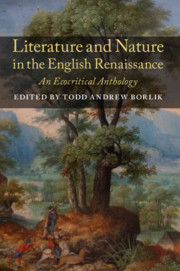Book contents
- Frontmatter
- Contents
- List of Illustrations
- Acknowledgements
- Editorial Principles: Towards the Ecocritical Editing of Renaissance Texts
- Introduction
- PART I Cosmologies
- Creation and the State of Nature
- Natural Theologies
- PART II The Tangled Chain
- PART III Time and Place
- PART IV Interactions
- PART V Environmental Problems in Early Modern England
- PART VI Disaster and Resilience in the Little Ice Age
- Appendix A Industrialization and Environmental Legislation in the Early Anthropocene: A Timeline
- Appendix B Further Reading: A Bibliography of Environmental Scholarship on the English Renaissance
Natural Theologies
from PART I - Cosmologies
Published online by Cambridge University Press: 05 June 2019
- Frontmatter
- Contents
- List of Illustrations
- Acknowledgements
- Editorial Principles: Towards the Ecocritical Editing of Renaissance Texts
- Introduction
- PART I Cosmologies
- Creation and the State of Nature
- Natural Theologies
- PART II The Tangled Chain
- PART III Time and Place
- PART IV Interactions
- PART V Environmental Problems in Early Modern England
- PART VI Disaster and Resilience in the Little Ice Age
- Appendix A Industrialization and Environmental Legislation in the Early Anthropocene: A Timeline
- Appendix B Further Reading: A Bibliography of Environmental Scholarship on the English Renaissance
Summary
The German scholar Johann Herder once claimed it was worth studying Hebrew for a decade simply to read Psalm 104 in its original language. With its evident similarities to the opening book of Genesis, it belongs to a group known as the Creation Psalms (which includes 8, 19, 25, 64, 139). But whereas Genesis presents an orderly, sober account of creation, Psalm 104 is rhapsodic and exuberant. Everything in nature revels in the pleasure of simply being alive, and its mere existence is apprehended as poetic. In a world of such extravagant splendour, song (or poetry) becomes a sacred duty, an outpouring of gratitude for the beauty of the earth and the numerous resources it provides to sustain and enrich life. Inspired by Psalm 148, the Jacobean preacher Godfrey Goodman would imagine every creature joined in an inaudible refrain of “We sing the praise of our Maker,” and assert that other animals are capable of prayer and even salvation (The Creatures Praising God, 1622, 22–8).
Traditionally, most of the Psalms, including 104, were attributed to King David. Biblical scholars today are dubious of Davidic authorship, and estimates of their provenance range from roughly 900 to 400 bce. Some parts of the Psalms may be even older, with roots in the “praise poetry” of ancient Egypt and Mesopotamia. The Creation Psalms, in other words, represent some of the oldest written records of eco-spirituality in world literature. Psalm translations were popular throughout early modern Europe, although many sacrificed literary merit to make them easier to sing. In the 1580s, Philip Sidney undertook to translate them into more sophisticated English verse. He completed the first forty-three before his untimely death in 1586. His sister Mary took up the project and finished it thirteen years later. Far from a slavish literal rendering, her Psalter is remarkable for its metrical ingenuity, and for the liveliness of its imagery that delights in the confusion of nature and culture. Its popularity is attested by eighteen extant manuscripts, and 104 seems to have been particularly admired, as it was one of three psalms transcribed in two different manuscripts (All Souls College, Oxford MS 155, 123r–7r; Inner Temple Library, Petyt MS 538, vol. 43, l284r–6r).
Source: Bodleian MS Rawl. Poet. 24, with annotations from Penshurst MS.
- Type
- Chapter
- Information
- Literature and Nature in the English RenaissanceAn Ecocritical Anthology, pp. 52 - 84Publisher: Cambridge University PressPrint publication year: 2019



